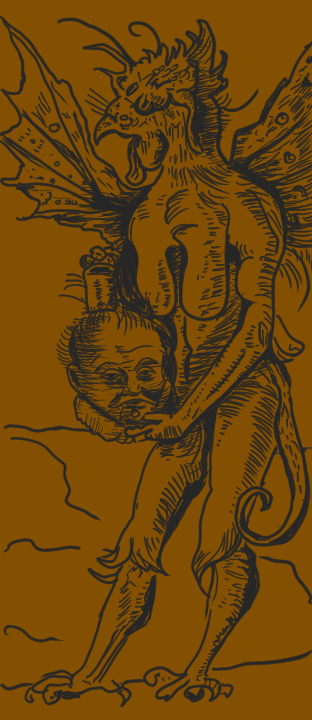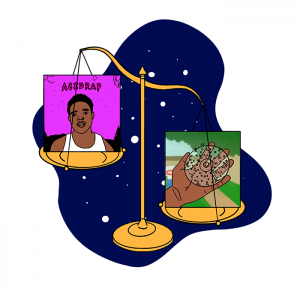Literature has historically presented many representations of the same cautionary tale. As the tale goes, when mishandled, this struggle between ambition and self restraint inevitably leads to a fall from grace preceded by a reckless practicing of one’s free will. In eighteenth century playwright Christopher Marlowe’s “The Tragical History of Doctor Faustus,” the character of Faustus represents humanity’s capacity to embody any of the Seven Deadly Sins at any given moment in life. Such a depiction begs the question, why did Marlowe choose to write about a subject that Elizabethan audiences were certain to find so suggestive, perhaps even taboo? One might also consider whether Marlowe was working out his own demons on the page, as many fiction writers are known to do. Undeniably, Marlowe’s contribution to the eternal cautionary tale not only marks the existence of humanity’s tendency towards self destruction, but implies through a relatable protagonist that it’s a struggle that humanity is doomed to perpetuate.
Under the assumption that we are indestructible, Marlowe’s cautionary tale speaks to the fact that humankind continuously fails to learn from the grave mistakes of others as if impervious to the misfortunes of someone else. Marlowe’s protagonist, Dr. John Faustus, a highly educated man of multiple disciplines, decides that his vast knowledge of medicine, law, and religion have yet to bring him the sense of satisfaction and fulfillment that he craves. As the tenth edition of The Norton Anthology of English Literature‘s introduction to “Doctor Faustus” asserts, “Faustus seeks the mastery and voluptuous pleasure that come from forbidden knowledge.” Deciding that he has no more to learn from academia, Faustus shifts his focus toward practicing the dark arts. When Faustus becomes torn between his feelings toward divinity and devilry, he ultimately declares to himself, “The god thou servest is thine own appetite.” Faustus decides for himself, of his own free will, that the “god” he will serve is himself, despite his recent deal with Lucifer. By essentially throwing caution to the wind, Faustus reveals his susceptibility to ill fated decisions. Despite his extensive education and vast knowledge, Faustus proves that even someone with such an impressive multidisciplinary intelligence is still capable of succumbing to their baser instincts.

illustrations by Aspen Crawford
History is filled with tragic fiction and nonfiction stories of individuals whose poor choices in life go so awry that they practically seal their fate beyond recovery or divine redemption. Of further note in The Norton Anthology’s introduction to Faustus, certain types of literature depict, “heroes who passionately seek power . . . striving to get beyond the conventional boundaries established to contain the human will.” As Marlowe’s tale shows, when hell bent on getting beyond such boundaries it’s possible to unwittingly allow ourselves to be negatively influenced or altogether seduced by nefarious forces. However, in Faustus’ case, he makes an impassioned choice, multiple times, to engage in abominable behavior. Perhaps one of Faustus’ most blatantly self serving deeds occurs when he proclaims to Lucifer’s demon familiar, Mephastophilis:
“I charge thee wait upon me whilst I live,
To do whatever Faustus shall command,
Be it to make the moon drop from her sphere,
Or the ocean to overwhelm the world.”
While referring to himself in the third person, Faustus presumes to be endowed with god like capabilities of controlling the elements and planets at the behest of one of Lucifer’s servants. As the story unfolds, Faustus’ insatiable lust for knowledge gradually escalates into a lust for power, which slowly erodes his sense of morality and discernment, spiralling him into an obliviousness to his own fallibility.
Marlowe reveals that wanton lust recklessly combined with free will can have dire consequences upon those who are convinced that their motives are admirable and beyond reproach. Certainly one of the most specific indications of the underlying motivation behind Faustus’ actions is when he admits to Mephastophilis that he intends “[t]o glut the longing of my heart’s desire.” Although in this scene he’s referring to seeking a female companion, at this point in the final pages of the narrative, with all that he’s been granted through his pact with Lucifer, it’s highly unlikely that he would truly be satisfied if this latest request were to be honored. Additionally, by including such an expression as to glut in his request, Faustus absent mindedly demonstrates the human capacity to personify one of the Seven Deadly Sins. Despite his best efforts, Faustus succumbs to the inevitable damnation that such a dangerous dalliance with the devil warrants. As Norton’s introduction to Faustus further contends, “Faustus’s fall is caused by the same pride and ambition that caused the fall of the angels in heaven and of humankind in the Garden of Eden.” Ultimately, Marlowe’s allegorical contribution to the cautionary tale genre of literature puts the universally familiar subject of reckless pride and ambition on full display, bringing the deadly consequences of corrupted free will into devastatingly vivid focus.
Marlowe’s compelling tale makes it clear that, despite Faustus’s espoused devotion to things both profane and sacred, he ultimately possesses no redeeming qualities. Intent on serving his own ignoble desires, the character of Faustus is exposed as being just as susceptible to eternal ruin as the lowliest of humanity. Although it’s unknown as to whether Christopher Marlowe was attempting to present a struggle with his own inner demons in “The Tragical History of Doctor Faustus,” his tale of a mortal’s road to perdition represents humanity’s inability to resist an all consuming pursuit of power combined with a flagrant abuse of free will. Sadly, this timeless tale, as with so many other thematically similar incarnations, has yet to alter humanity’s nature of being easily seduced towards self destruction.
2,065

Same Old Story, Different Title
A Reflection on Christopher Marlowe’s "The Tragical History of Doctor Faustus"
Literature has historically presented many representations of the same cautionary tale. As the tale goes, when mishandled, this struggle between ambition and self restraint inevitably leads to a fall from grace preceded by a reckless practicing of one’s free will. In eighteenth century playwright Christopher Marlowe’s “The Tragical History of Doctor Faustus,” the character of Faustus represents humanity’s capacity to embody any of the Seven Deadly Sins at any given moment in life. Such a depiction begs the question, why did Marlowe choose to write about a subject that Elizabethan audiences were certain to find so suggestive, perhaps even taboo? One might also consider whether Marlowe was working out his own demons on the page, as many fiction writers are known to do. Undeniably, Marlowe’s contribution to the eternal cautionary tale not only marks the existence of humanity’s tendency towards self destruction, but implies through a relatable protagonist that it’s a struggle that humanity is doomed to perpetuate.
Under the assumption that we are indestructible, Marlowe’s cautionary tale speaks to the fact that humankind continuously fails to learn from the grave mistakes of others as if impervious to the misfortunes of someone else. Marlowe’s protagonist, Dr. John Faustus, a highly educated man of multiple disciplines, decides that his vast knowledge of medicine, law, and religion have yet to bring him the sense of satisfaction and fulfillment that he craves. As the tenth edition of The Norton Anthology of English Literature‘s introduction to “Doctor Faustus” asserts, “Faustus seeks the mastery and voluptuous pleasure that come from forbidden knowledge.” Deciding that he has no more to learn from academia, Faustus shifts his focus toward practicing the dark arts. When Faustus becomes torn between his feelings toward divinity and devilry, he ultimately declares to himself, “The god thou servest is thine own appetite.” Faustus decides for himself, of his own free will, that the “god” he will serve is himself, despite his recent deal with Lucifer. By essentially throwing caution to the wind, Faustus reveals his susceptibility to ill fated decisions. Despite his extensive education and vast knowledge, Faustus proves that even someone with such an impressive multidisciplinary intelligence is still capable of succumbing to their baser instincts.
illustrations by Aspen Crawford
History is filled with tragic fiction and nonfiction stories of individuals whose poor choices in life go so awry that they practically seal their fate beyond recovery or divine redemption. Of further note in The Norton Anthology’s introduction to Faustus, certain types of literature depict, “heroes who passionately seek power . . . striving to get beyond the conventional boundaries established to contain the human will.” As Marlowe’s tale shows, when hell bent on getting beyond such boundaries it’s possible to unwittingly allow ourselves to be negatively influenced or altogether seduced by nefarious forces. However, in Faustus’ case, he makes an impassioned choice, multiple times, to engage in abominable behavior. Perhaps one of Faustus’ most blatantly self serving deeds occurs when he proclaims to Lucifer’s demon familiar, Mephastophilis:
“I charge thee wait upon me whilst I live,
To do whatever Faustus shall command,
Be it to make the moon drop from her sphere,
Or the ocean to overwhelm the world.”
While referring to himself in the third person, Faustus presumes to be endowed with god like capabilities of controlling the elements and planets at the behest of one of Lucifer’s servants. As the story unfolds, Faustus’ insatiable lust for knowledge gradually escalates into a lust for power, which slowly erodes his sense of morality and discernment, spiralling him into an obliviousness to his own fallibility.
Marlowe reveals that wanton lust recklessly combined with free will can have dire consequences upon those who are convinced that their motives are admirable and beyond reproach. Certainly one of the most specific indications of the underlying motivation behind Faustus’ actions is when he admits to Mephastophilis that he intends “[t]o glut the longing of my heart’s desire.” Although in this scene he’s referring to seeking a female companion, at this point in the final pages of the narrative, with all that he’s been granted through his pact with Lucifer, it’s highly unlikely that he would truly be satisfied if this latest request were to be honored. Additionally, by including such an expression as to glut in his request, Faustus absent mindedly demonstrates the human capacity to personify one of the Seven Deadly Sins. Despite his best efforts, Faustus succumbs to the inevitable damnation that such a dangerous dalliance with the devil warrants. As Norton’s introduction to Faustus further contends, “Faustus’s fall is caused by the same pride and ambition that caused the fall of the angels in heaven and of humankind in the Garden of Eden.” Ultimately, Marlowe’s allegorical contribution to the cautionary tale genre of literature puts the universally familiar subject of reckless pride and ambition on full display, bringing the deadly consequences of corrupted free will into devastatingly vivid focus.
Marlowe’s compelling tale makes it clear that, despite Faustus’s espoused devotion to things both profane and sacred, he ultimately possesses no redeeming qualities. Intent on serving his own ignoble desires, the character of Faustus is exposed as being just as susceptible to eternal ruin as the lowliest of humanity. Although it’s unknown as to whether Christopher Marlowe was attempting to present a struggle with his own inner demons in “The Tragical History of Doctor Faustus,” his tale of a mortal’s road to perdition represents humanity’s inability to resist an all consuming pursuit of power combined with a flagrant abuse of free will. Sadly, this timeless tale, as with so many other thematically similar incarnations, has yet to alter humanity’s nature of being easily seduced towards self destruction.
The 2021 Portland Book Festival
Highlight from This Year's Hybrid Book Festival
You may also like
In Case You Missed It: Portland Book Fest 2023
Pop-Up Readings
The Same Old Apocalypse